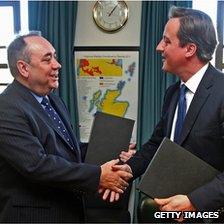Scottish independence: Braveheart or iPad?
- Published

Alex Salmond and David Cameron have agreed on referendum terms
The price of a third-generation iPad. That seems to be enough to swing the independence referendum.
If independence made them £500 better off, 65% of Scots told one poll they'd vote for it.
But if it made them as much worse off, only 21%.
So there's no doubt that the economy, and perceptions of how it could be affected by independent nationhood, is going to play big in the next two years of campaigning - at least as big as questions of identity and calls on Braveheart patriotism.
So the big economic questions include: would independence boost growth or hinder it? Would it boost employment, and improve the quality of jobs? Or the opposite?
And what currency would Scotland use? Would European partners insist that it adds to the queue to join the euro, however much it then drags its feet?
Or on what conditions would it use the pound sterling? Could those conditions include the same kind of restrictions on borrowing and spending that Scotland already faces, and which are among the main planks of the campaign for a "yes" vote.
If the experience of the eurozone is any guide (and it should be), the Treasury and the Bank of England would be looking for similar constraints on Holyrood's budget powers as the German government wants from its smaller eurozone partners.
Look at it from another point of view: an independent Scotland should want to be clear how much it is on the hook if the rest of the UK has another financial crisis, and comes to its northern currency partner for a big bail-out.
For those only now waking up to the significance of the choice facing Scottish voters in autumn 2014, those are some of the bigger questions already being addressed in the debate so far.
Financial fog on the Tyne
But look at it another way, as BBC Newcastle did last week. It commissioned research into the way public money is distributed around the UK's nations and regions. And it used it to examine, over several days of news coverage, whether Geordies would be "better off Scots"?
In one way, it only confirmed that the Barnett Formula, now aged 34, allocates more per head than the average English person does.
By breaking down spending heads, it also showed where the average Scot has the biggest spending advantage over the average English person.
Scotland is tops for spending on economic affairs. That's a sore point in the north-east, which has watched some rather valuable projects attracted north of the border, and it no longer has a Regional Development Agency with which to fight Scottish Enterprise for those jobs.
Health is often cited as one reason why Scotland benefits from the UK's division of taxpayer spoils. But it turns out that London, Northern Ireland and, by a very narrow margin, the north-east of England, had a higher spend per head in 2010-11.
On social protection, including pensions and welfare, Scotland was not top of the table. Instead, Wales, the northeast, Northern Ireland and the north-west of England came out ahead.
The overall outcome suggests the north-east of England has plenty reason to grumble about the share of the pie it's getting.
London weighting
But perhaps the most striking aspect of these figures is how much variation there is within England.
It's London that gets the lion's share of spending, most notably in transport. In 2010-11, the total government spend on the average Londoner was £10,198.
Northern Ireland was the only part of the UK ahead of that, on £10,668, while Scotland came third on the table at £10,165.
From a Scottish perspective, it's puzzling why distribution of government spending within England is not more of an issue, and doesn't feed through into a stronger lobby. Why don't the less favoured areas, such as the north-east, demand more of a share of what is being distributed within England?
On a day when many in the rest of the UK, along with eyes around the world, have begun to focus on the independence referendum, one interesting area to watch is how this will play within England over the next two years.
And if there's to be a "no" vote, what then would happen to the distribution of both powers and finances around the rest of the UK?